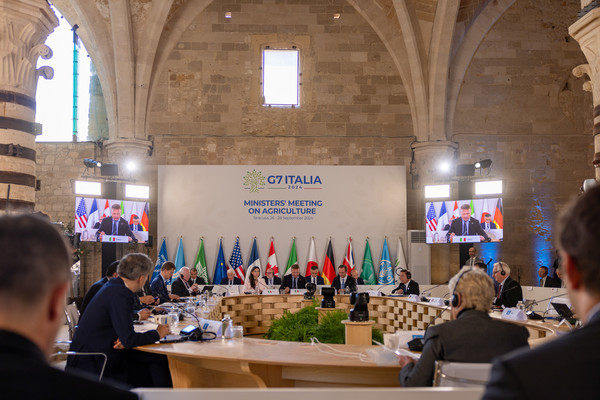
The G7 Agriculture meeting, the centrality of food security
The summit between the ministers of agriculture ended on September 28th on the island of Ortigia in Syracuse. The commitment of the “big seven” to promote sustainable agriculture that respects community rights. A new model of cooperation with Africa
Strengthening agriculture for profitable, resilient, equitable and sustainable food systems, promoting science and innovation in agriculture to mitigate climate change and adapting production processes to the new context, investing in young people to promote change in the primary sector and food systems, and encouraging the use of increasingly sustainable practices, these are the priority lines of action identified by the G7 agriculture ministers to combat the malnutrition emergency which, according to UN figures, still affects more than 730 million people worldwide (approximately 10% of the global population). It is precisely for this reason that the Italian presidency of the G7 Agriculture meeting greatly desired the summit held from 26 to 28 September on the island of Ortigia in Syracuse to have food sovereignty as its primary theme.
During the summit, the ministers of the seven most industrialized countries in the world stressed the need to promote food systems capable of providing safe, accessible, nutritious and quality food for all people and to reduce losses and waste, while at the same time respecting the rights of those who produce that food and the cultural specificities of rural communities, which often form the basis of their eating habits and consumption styles. To overcome the challenge of food self-sufficiency – it was explained at the conclusion of the summit – it is essential to combat climate change and the loss of biodiversity, enhancing the role of farmers (and fishermen) as custodians of the land, aquatic environments and natural resources.
Another prominent theme addressed by the G7 in Ortigia was the profitability of agricultural activities. On this front, the agriculture ministers signed a commitment to strengthen actions aimed at a fair distribution of value within agricultural supply chains and food systems, together with that for a rules-based, free and fair, equitable and transparent multi-lateral trading system.
In this scenario, innovation is called to play the role of system “game changer”. From Artificial Intelligence to automation, the digitalization of production processes to the interconnection of systems, and georeferencing, the latest generation technologies can transform the agricultural economies of the planet, optimizing production processes, rationalizing (increasingly scarce) resources, reducing the impact on the environment and improving the profitability of the primary sector. But the development and application of new technologies – the seven agriculture ministers reiterated – cannot ignore respect for the dignity of the person and human rights, thus recalling the aforementioned principle of food sovereignty.
The G7 Agriculture meeting also paid particular attention to the situation in Africa. The continent has extraordinary agricultural potential – just think of the large availability of arable land – but it is not being used in an appropriate manner.
The development of African agricultural economies is affected by the strong technological gap and the lack of adequate skills on the part of operators, which do not allow for the optimization of cultivation practices and production processes.
As a result, many African territories still practice subsistence agriculture, which is unable to meet the food needs of the population. It is also because of these deficits that approximately half of the world's undernourished population - almost 300 million people out of a total of over 730 million - is found in Africa.
The commitment to further strengthen cooperation with African countries and organizations, signed in Ortigia by the "big seven", is aimed not only at freeing millions of people from conditions of extreme poverty, which then fuel migratory flows towards Mediterranean Europe, but also at strengthening a global agricultural economy that in 2050 will have to satisfy the food needs of 10 billion people. The aim of the agreement is also to leverage synergies, actively involving African countries in the transfer of knowledge and good practices.
This could be the key to a new way of cooperating with Africa; a way that could finally free the African continent from the endemic conditions of food fragility.








